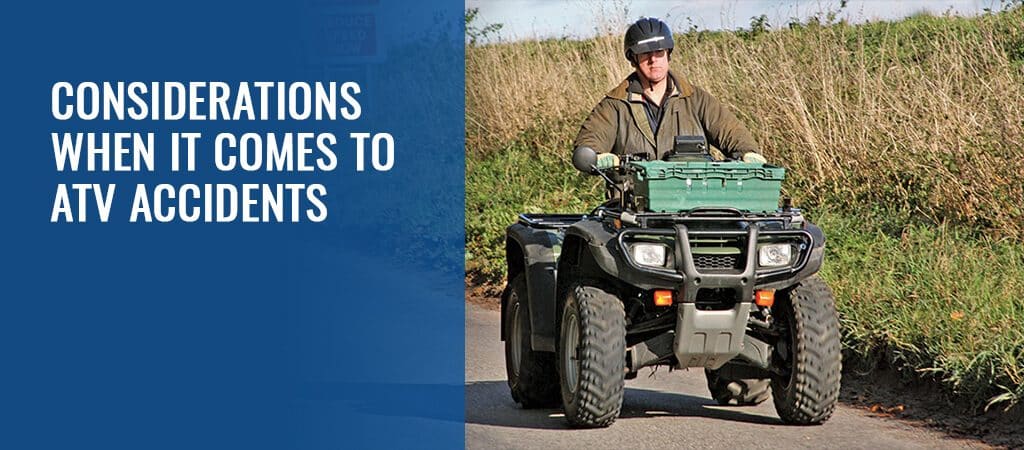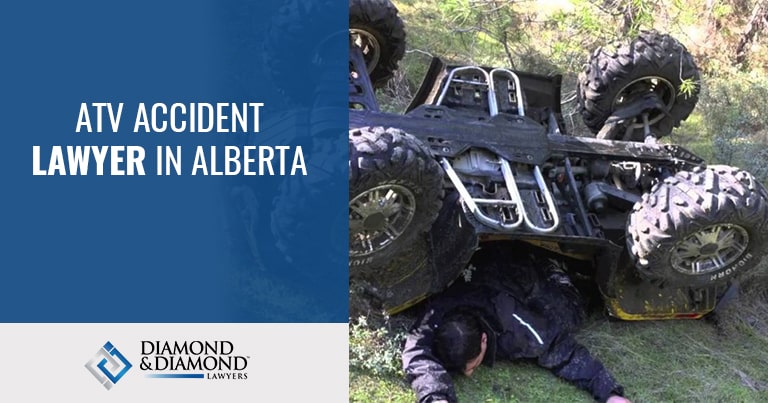All-terrain vehicles (ATVs) are fun to drive and ride in. They provide you, your family, and friends with an enjoyable way to access and explore some of the more off the track places. ATVs are highly engineered, so are surprisingly stable even when driven over rough surfaces. But, only if you are careful, read the terrain well, use the right safety equipment and maintain the ATV correctly.
Sadly, ATV accidents do happen, and you can be seriously hurt. In Ontario alone, in 2018, nearly 15,000 people sought medical help from a hospital or emergency room after having an all-terrain or off-road vehicle accident.
If you, or your loved one, have been hurt while using or riding in an all-terrain vehicle, it’s best to consult with a personal injury lawyer who specializes in ATV accidents. This is especially the case if the accident happens off-road. Or when you are riding a rented vehicle or if you are using it to carry out work duties. All of those situations will add to the complexity of your compensation case.
Serious Injuries in ATV Accidents
Despite these vehicles being robustly built, the occupants are more exposed than they would be in other kinds of vehicles. So, they can easily end up suffering from the following injuries:
- Fractures
- Dislocated shoulders
- Other joint dislocations
- Fractured ribs
- Broken limbs
- Cuts and bruises
- Head injuries
- Concussions
- Brain injuries
- Internal injuries
- Internal bleeding
- Neurological injuries
- Organ damage
- Spinal cord injuries
- Injuries to the back area
- Injuries to the neck area
- Crush injuries
- Deep lacerations
- Death
If you are badly hurt, it can take you many months, maybe more than a year to recover. During which time you are highly unlikely to be able to work.
The cost of treatment, rehabilitation, drugs, specialist equipment and personal care can be high. So, if you have the chance to recoup some, or all, of those costs by making an accident or personal injury claim you will want to do so. If there is a passenger involved they will likely want to do the same.
Considerations When It Comes to ATV Accidents

If you got hurt in an ATV accident, it pays to look at and review all of the facts. Doing so will help your lawyer to build a strong compensation case for you. We will want to know the following:
- Who is the owner of the ATV?
- Was it properly maintained?
- What is the make, model, and year of the vehicle?
- Was the ATV known to be defective?
- Is the ATV licensed and insured?
- Was the ATV being used for recreational purposes or to carry out farm or another kind of work?
- Were you the driver or just a passenger at the time of the accident?
- What safety equipment was fitted to the vehicle and was it in full working order?
- What safety equipment was the injured party wearing at the time of the accident?
- When was that safety equipment last checked?
- Under what conditions did the accident occur?
- In your opinion, what caused or contributed to the accident?
- Did it take place on public or private land? On a highway or off-road?
- If you hired the ATV or were riding it at a leisure facility what training was provided?
- Did the ATV have any form of insurance, if yes, what type?
These kinds of accident cases often get complicated. So, it’s always wise to consult with an ATV accident lawyer.
What are the Leading Causes of ATV Accidents?
Understanding what the main causes of all-terrain vehicle accidents are can help you to take the additional steps to avoid having an accident yourself. The main causes of ATV accidents are:
- Colliding with another vehicle – Surprisingly around a third of the accidents that people have while using ATVs involves them hitting or being hit by another vehicle. Even more surprisingly, virtually all of those accidents take place on paved roads.
- Not using a helmet – The fact that these vehicles have four wheels leads to a false sense of security. Plus, when you are riding off-road, especially on private land, you know that you are not going to get into trouble. But, it is never worth the risk, the chances of rolling an ATV over are high. As is falling off and banging your head, which is why serious head, brain and neck injuries are the most common type of ATV accident injuries.
- Not using other safety equipment – People suffer serious cuts when they have an ATV accident because they are not dressed appropriately. Wearing gloves, sturdy boots, and clothing such as the type a motorcyclist might use, all help to protect you from this kind of injury. They can also reduce the chances of heavy bruises and occasionally of your breaking a finger, your foot, or toes.
- Riding after drinking or taking drugs – Again, because most of the riding takes place on private land or away from the authorities a surprisingly high percentage of ATV riders ride while under the influence of drugs or alcohol. One study showed that 11% of injured riders fell into this category.
- Inexperience and over-reaching – The majority of the riders that have accidents do not have much experience. There is a tendency for people to try to do too much and to attempt to perform tricks. Young riders are particularly prone to having accidents. Especially those aged under 16.
Get expert legal advice if you or your loved one got hurt in an ATV accident. Speak with an Alberta personal injury lawyer from Diamond & Diamond Law now.
Call an Alberta ATV accident lawyer from Diamond & Diamond
Diamond & Diamond Law has extensive experience of all kinds of car accident cases in Alberta
We also handle ATV accidents, and other cases that involve recreational vehicles, like snowmobiles, dune buggies etc.
If you are involved in an accident while using a leisure vehicle you can get in touch with us in the following ways:
By using our 1-800 number to get a free consultation
Visiting our Alberta legal offices, where your initial discussion with us will be free
Using the online contact form that you can find on our website to book a free phone, video call or in-person consultation
PRO TIP :
“Never overestimate the safety promised by ATVs. Remember that you’re often using them on uneven roads, and that alone already poses some risks.”
FAQ's on ATV Accident Lawyer in Alberta
Are ATV accidents covered by insurance in Alberta?
Most ATV accidents will be covered by insurance in Alberta. If you are planning to ride your vehicle on permitted public streets, highways or land having a third-party policy is obligatory. However, you are not obliged to have insurance if you only plan to ride on private land. So, there is always a chance that an ATV accident will not be covered by insurance.
I got hurt the first time I rode an ATV, was it my fault because I was a newbie?
Having an accident the first time you ride an ATV, does not automatically mean that the accident will be treated as if it is your fault. Wearing the right safety equipment, riding a legal machine, and having put yourself through rider training will all help your case. All of these actions show that you have taken reasonable steps to avoid having an accident.
I didn’t wear a helmet when I got hurt riding an ATV, is that my fault?
The fact that you did not wear a helmet while riding an ATV does not automatically make that accident your fault. However, it will be factored in when considering how much compensation you may be entitled to. At least if the injury you are claiming for is one to the head. In which case, you will likely be deemed to be partially at blame and receive a far smaller payout as a result.



